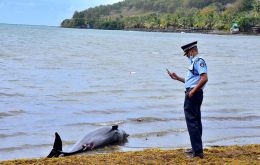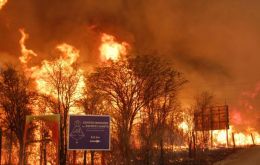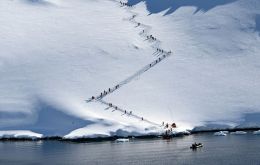MercoPress. South Atlantic News Agency
Environment
-
Monday, August 31st 2020 - 09:38 UTC
South Georgia announces the launching of a 'Visitor's Guide' film narrated by Sir David Attenborough
![Silverback Films Ltd producer/director Jon Clay filming king penguins at Salisbury Plain, South Georgia [STEVE BROWN]](/data/cache/noticias/77748/260x165/steve-brown-salisbury-plain-2.jpg)
The Government of South Georgia & the South Sandwich Islands (GSGSSI) is excited to announce the launch of its new film ‘South Georgia – A Visitor’s Guide’, narrated by Sir David Attenborough. The film (*) has two key messages; firstly, it encourages visitors to respect and protect the island so their visit can be truly sustainable, but there is another message which is relevant to us all; proof that nature can recover, if we give it the chance.
-
Monday, August 31st 2020 - 09:37 UTC
A Visitor's Guide: Frequently Asked Questions Where is South Georgia?
![King penguins at St Andrews Bay, South Georgia. [IAN PARKER, UNSPLASH]](/data/cache/noticias/77747/260x165/parker.jpg)
South Georgia is situated 800 miles SE of the Falkland Islands. The main island of South Georgia is approximately 170 km long and between 2 and 40 km wide and occupies an area of 3,755 km2, more than half of which is permanently ice covered. The coast is rich in wildlife and home to huge collies of penguins, seals and albatross.
-
Saturday, August 29th 2020 - 08:50 UTC
Some forty dolphins die in area of Mauritius affected by a Japanese tanker oil spill

At least 40 dolphins have mysteriously died in an area of Mauritius affected by an oil spill from a Japanese boat, officials and witnesses said on Friday, as onlookers described the deaths of one mother dolphin and her baby.
-
Thursday, August 27th 2020 - 09:05 UTC
Parade of penguins waddling to burrows, a lockdown online hit in Australia

A nightly penguin parade live-streamed from a deserted Australian park has become an online lockdown hit, with hundreds of thousands tuning in to watch the cute creatures waddle back to their burrows from the sea.
-
Wednesday, August 26th 2020 - 09:50 UTC
Fires are raging in several Argentine provinces fueled by strong winds and persistent drought

Fires are raging in Argentina’s Cordoba province, prompting evacuations and threatening to destroy homes, fueled in part by strong winds and a lack of rain, officials said on Monday.
-
Wednesday, August 26th 2020 - 08:49 UTC
Two female Gentoo penguins are raising a baby chick in Spanish aquarium

Two female gentoo penguins are new moms at an aquarium in Spain and are raising the baby chick they adopted as an egg.
-
Tuesday, August 25th 2020 - 09:29 UTC
Why the pandemic’s pause on travel could be a defining moment for rethinking Antarctic tourism

By Eilís Quinn, Eye on the Arctic (*) – The current pause on international travel could be an important moment for the international community to rethink the future development of Antarctic tourism, says an expert on the region.
-
Tuesday, August 25th 2020 - 08:20 UTC
Germany floats 11 billion Euros in “green bonds” to fund environmental projects

Germany on Monday announced details of its first “green” bond placing, tapping financial markets to fund environmental projects for the first time. The finance ministry said it would raise up to 11 billion Euros in 2020 to support climate-related projects.
-
Monday, August 24th 2020 - 09:25 UTC
Despite Merkel’s “serious doubts,” German industry defends the Mercosur-EU agreement
![“We are skeptical [on the trade agreement]. The Amazon affects the whole world,” said Merkel's spokesman.](/data/cache/noticias/77648/260x165/merkel.jpg)
After Germany’s Chancellor Angela Merkel stated on Friday “considerable doubts” over whether to keep backing the European Union’s (EU) trade deal with the Mercosur due to environmental threats that represent the deforestation in Brazil’s Amazonia, the Association of German Chambers of Industry and Commerce (DIHK) responded defending the agreement that was reached last year.
-
Monday, August 24th 2020 - 08:23 UTC
Chile slaps record fine of US$ 6 million on Norwegian salmon farming company for the escape of 700,000 fish

Chile's environmental protection service said on Friday it had slapped a record US$ 6.6 million fine on a Norwegian salmon producer for the 2018 escape of 690,000 antibiotic-fed fish.
